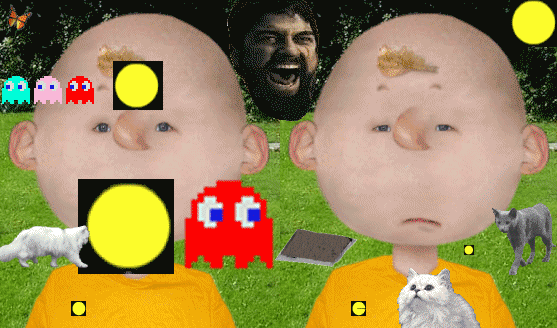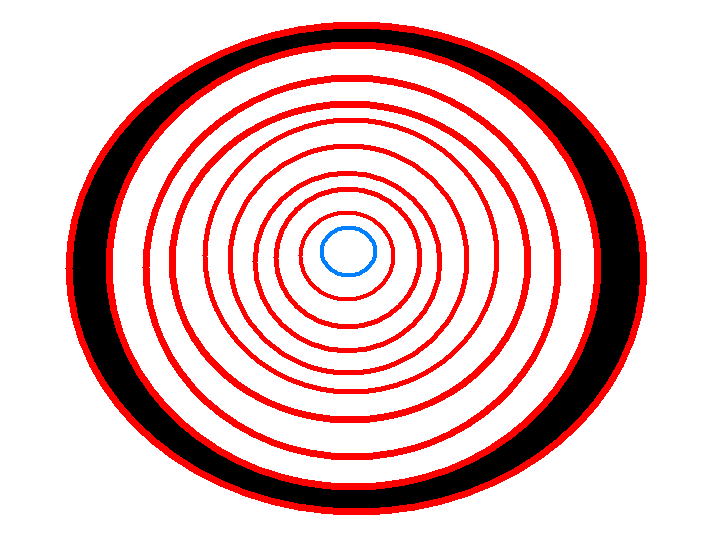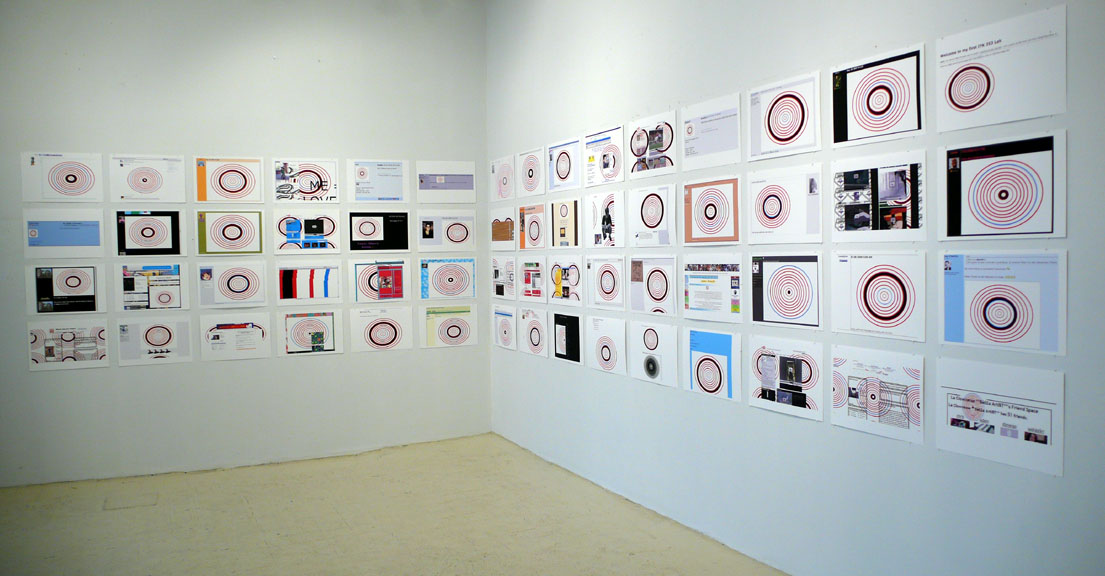...more recent posts
Class #21
Today while you WORK I will chatter on about copyright, fair use and gleeful brazen theft.

(image downloaded from YTMD created from oodles of copyrighted material)
Internet larceny makes the rocking web world go round.
A current thread about fair use issues here:http://www.artfagcity.com/2008/11/10/afc-receives-cease-and-desist-from-the-estate-of-helmut-newton/
A good site for info on all those cease and desist letters that you will receive after taking this class:http://www.chillingeffects.org/
Tom Moody's Optidiscs:

And their travels all over the web:

From http://artmovingprojects.blogspot.com/2008/05/tom-moodys-optidisc-online-installation.html
Now as we joyfully trip across the web grabbing what ever we need, keep in mind that someone could also grab your web art and slap swastikas on it. (I was going to say: use it in a porn production, but you little pervs would probably be delighted)
A terrific source for info on current Canadian copyright issues, is Michael Geist:
Dr. Michael Geist is a law professor at the University of Ottawa where he holds the Canada Research Chair of Internet and E-commerce Law. He has obtained a Bachelor of Laws (LL.B.)degree from Osgoode Hall Law School in Toronto, Master of Laws (LL.M.) degrees from Cambridge University in the UK and Columbia Law School in New York, and a Doctorate in Law (J.S.D.) from Columbia Law School.It is Fair use to copy and paste, quote, a small section of the text from his web site to criticize it, comment upon it or teach about it.
Works without copyright are considered to be in the Public Domain. you can use them any way you want. (restrictions will still apply for commercial use, and academic use: Attribution everyone)
-One thing to note is that the reason the CRIA hasn't been suing your asses for all the music you download is because, currently, it's (sort of) legal in Canada, because the Canadian government taxes recordable media on the presumption that every DVD and CD is purchase in order to record copyrighted material. (we are talking about personal use here)
From The ecstasy of influence: A plagiarism by Jonathan Lethem (if you haven't read his novel Motherless Brooklyn, it's stellar.)
Most artists are brought to their vocation when their own nascent gifts are awakened by the work of a master. That is to say, most artists are converted to art by art itself. Finding one's voice isn't just an emptying and purifying oneself of the words of others but an adopting and embracing of filiations, communities, and discourses. Inspiration could be called inhaling the memory of an act never experienced. Invention, it must be humbly admitted, does not consist in creating out of void but out of chaos. Any artist knows these truths, no matter how deeply he or she submerges that knowing.
[...]
It's worth noting, then, that early in the history of photography a series of judicial decisions could well have changed the course of that art: courts were asked whether the photographer, amateur or professional, required permission before he could capture and print an image. Was the photographer stealing from the person or building whose photograph he shot, pirating something of private and certifiable value? Those early decisions went in favor of the pirates. Just as Walt Disney could take inspiration from Buster Keaton's Steamboat Bill, Jr., the Brothers Grimm, or the existence of real mice, the photographer should be free to capture an image without compensating the source. The world that meets our eye through the lens of a camera was judged to be, with minor exceptions, a sort of public commons, where a cat may look at a king.
Novelists may glance at the stuff of the world too, but we sometimes get called to task for it. For those whose ganglia were formed pre-TV, the mimetic deployment of pop-culture icons seems at best an annoying tic and at worst a dangerous vapidity that compromises fiction's seriousness by dating it out of the Platonic Always, where it ought to reside. In a graduate workshop I briefly passed through, a certain gray eminence tried to convince us that a literary story should always eschew “any feature which serves to date it” because “serious fiction must be Timeless.” When we protested that, in his own well-known work, characters moved about electrically lit rooms, drove cars, and spoke not Anglo-Saxon but postwar English—and further, that fiction he'd himself ratified as great, such as Dickens, was liberally strewn with innately topical, commercial, and timebound references—he impatiently amended his proscription to those explicit references that would date a story in the “frivolous Now.” When pressed, he said of course he meant the “trendy mass-popular-media” reference. Here, transgenerational discourse broke down.
I was born in 1964; I grew up watching Captain Kangaroo, moon landings, zillions of TV ads, the Banana Splits, M*A*S*H, and The Mary Tyler Moore Show. I was born with words in my mouth—“Band-Aid,” “Q-tip,” “Xerox”—object-names as fixed and eternal in my logosphere as “taxicab” and “toothbrush.” The world is a home littered with pop-culture products and their emblems. I also came of age swamped by parodies that stood for originals yet mysterious to me—I knew Monkees before Beatles, Belmondo before Bogart, and “remember” the movie Summer of '42 from a Mad magazine satire, though I've still never seen the film itself. I'm not alone in having been born backward into an incoherent realm of texts, products, and images, the commercial and cultural environment with which we've both supplemented and blotted out our natural world. I can no more claim it as “mine” than the sidewalks and forests of the world, yet I do dwell in it, and for me to stand a chance as either artist or citizen, I'd probably better be permitted to name it.
(Myfanwy Ashmore made a similar observation to me years ago in reference to her flaunting of copyright withr the computer games she hacks into. The copyrighted property of these game producers littered her childhood.)
More from Lethem:
Artists and writers—and our advocates, our guilds and agents—too often subscribe to implicit claims of originality that do injury to these truths. And we too often, as hucksters and bean counters in the tiny enterprises of our selves, act to spite the gift portion of our privileged roles. People live differently who treat a portion of their wealth as a gift. If we devalue and obscure the gift-economy function of our art practices, we turn our works into nothing more than advertisements for themselves. We may console ourselves that our lust for subsidiary rights in virtual perpetuity is some heroic counter to rapacious corporate interests. But the truth is that with artists pulling on one side and corporations pulling on the other, the loser is the collective public imagination from which we were nourished in the first place, and whose existence as the ultimate repository of our offerings makes the work worth doing in the first place.
